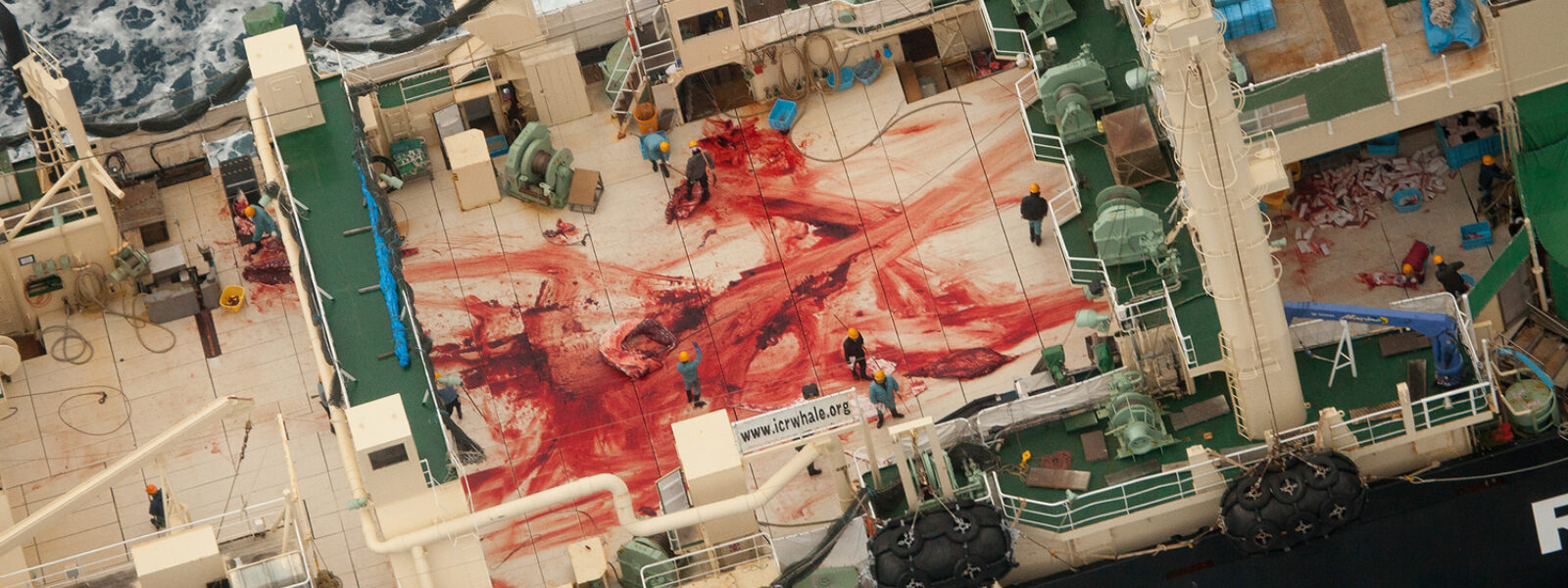
ECO: IWC Rejects Japan’s Push for Commercial Whaling
Conservation-minded nations at the International Whaling Commission meeting in Brazil soundly rejected yet another push by Japan to end the moratorium on commercial whaling. Forty-one nations voted against the resolution from Japan; only 27 nations voted for it. Several nations, like Russia and Korea, abstained from the vote.
The government of Japan was joined by many nations that the country bribes to attend the IWC and vote in favor of whaling, including many landlocked nations and many small countries in the Caribbean. The two whaling nations, Iceland and Norway, also voted in favor of lifting the ban. Japan needed a three-quarters majority in order to have the whaling moratorium, first approved by three-quarters vote of the IWC in 1982, overturned.
The IWC earlier had approved a non-binding statement offered by Brazil, the "Florianopolis Declaration", which states that commercial whaling is no longer a necessary economic activity and that conservation of whales should be the future of the IWC.
However, the meeting was a mixed bag for whales. While the rejection of the renewed whaling resolution and adoption of the “Florianopolis Declaration” were major successes, other decisions did not go as well for the whales.
A major effort led by the United States resulted in “bundling” several nations’ request for subsistence quotas into one vote – with the nations telling the rest of the IWC to take it or leave it. The package was overwhelmingly approved, as many nations support subsistence uses of whales by Native groups while still opposing commercial whaling.
But there were major problems with the package. In addition to requiring an up or down vote, several of the quotas have questionable “subsistence” value. Denmark, for example, representing Greenland, received increased quotas for killing humpback and minke whales for its Native population, but research by conservation organizations has shown that about half of the whale meat from so-called “subsistence” hunts winds up in supermarkets for sale in Greenland. The IWC is only supposed to allow subsistence hunts for traditional sharing of the meat, not commercial sale, as is done by the Inuit people of Alaska with their bowhead quota.
Quotas were also approved for Russia, which sends out modern capture boats to harpoon gray whales for subsistence use by Siberians, and Bequia, a small island in the Caribbean which hunts humpback whales, killing off a potential source of revenue for whale watching and tourism. In 2017, Russia killed 120 gray whales; Bequia killed one humpback (they now have a quota of 4 humpbacks per year); US Inuit tribes killed 58 bowhead whales in the Arctic; and Greenlanders killed 153 whales of different species.
A major problem with the package is that, for the first time, the quotas were set in perpetuity, to be reviewed by the IWC Scientific Committee, but no longer by the full IWC body. Issues with subsistence hunting have thus been insulated from concerns raised by environmental and animals welfare organizations about the hunts.
Iceland and Norway have both filed formal objections to the whaling moratorium and are therefore exempt from its provisions. In 2017, Iceland killed 17 whales, mostly fin whales, while Norway killed 432 minke whales. So far this year, Iceland has killed 125 whales. A large portion of the whale meat and blubber from these hunts is exported to Japan, in violation of the Convention on the International Trade in Endangered Species (CITES).
Japan killed 596 whales in 2017, mostly minke whales but other species as well, claiming they were slaughtered for scientific research. Most observers reject that claim and contend that Japan is actually using scientific permits to keep their flagging whaling industry alive. The government heavily subsidizes the Japanese whaling fleet, as the Japanese public does not eat or want to eat much whale meat.
As is usually the case, after the vote in favor of keeping the moratorium in place, the Japan government once again threatened to leave the IWC, as they have done so repeatedly through the years.
"If scientific evidence and diversity is not respected, if commercial whaling is completely denied ... Japan will be pressed to undertake a fundamental reassessment of its position as a member of the IWC," stated Japan’s Vice-Minister for Fisheries Masaaki Tanial.
Commissioner Daven Joseph, a long-time puppet of the Japanese government and representative of several Caribbean nations at the IWC (this time around, he was representing Antigua and Barbuda), was characteristically more blunt: "They can take this organization and send it to the abyss where whales go when they die!"
The International Marine Mammal Project is urging the Japanese government to permanently end the killing of whales and dolphins in time for the 2020 Olympics. Please sign and share our petition.
